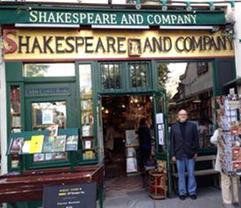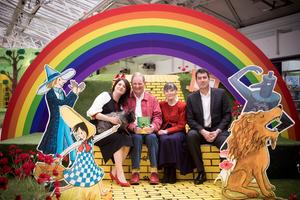 While many attendees believed beforehand that Brexit and the new administration in Washington might overshadow the event, last week's London Book Fair was a busy, energetic, refreshing gathering. The trade show floor was crowded as soon as it opened, and that pace continue through until Thursday's closing. Politics was a frequent topic, but it didn't dominate the event.
While many attendees believed beforehand that Brexit and the new administration in Washington might overshadow the event, last week's London Book Fair was a busy, energetic, refreshing gathering. The trade show floor was crowded as soon as it opened, and that pace continue through until Thursday's closing. Politics was a frequent topic, but it didn't dominate the event.
Some attendees had also worried about the effect of the fair's move to mid-March from its usual April time, but that concern quickly dissipated--and the move was greeted so positively that several American exhibitors were hoping that the fair will continue to be held in March because of its timing just before the spring season begins and its distance from BookExpo. (In fact, the show returns to April next year.) Mild March weather in London probably helped significantly.
---
The Bookstore of the Year Award, part of the London Book Fair International Excellence Awards and sponsored by Gardners, was won by Shakespeare and Company in Paris. The store was cited for "the way it has endeavoured to become a 21st century bookseller. It has opened a café, expanded its children's section and revamped its website to include the introduction of online purchasing. Its extensive events programme is now brought to people around the world via video and audio podcasts."
---
During a panel about the future of British comics, the discussion turned to the decline of newsstands and what comic book publishers have done to replace the role they played in the discoverability and accessibility of comics. Ben Smith, head of books and comics publishing at Rebellion Publishing, said that while newsstands and sales of single issue comics have declined, the graphic novel format has "exploded in the book trade," and bookstores are "essential" now for reaching new readers.
Mike Stirling of Beano Studios agreed that "the bookshop is a wonderful opportunity for comics," adding that bookshops and comic shops provide a level of "care, attention and order" that is beyond what other physical retailers provide.
Kieron Gillen, writer and creator of The Wicked + The Divine, said that in a way, monthly single-issue comics have become "loss leaders for our collections" that are published periodically in graphic novel format. He also identified two audiences for comic books: those who follow each issue month to month and those who buy the periodicals every six months or so. Gillen noted that both audiences are essential for a successful comic book, but the latter audience is larger.
---
 |
|
| At LBF: HarperCollins Children's Books executive publisher Ann-Janine Murtagh; Michael Morpurgo, who will write Toto, a retelling of The Wonderful Wizard of Oz; Clare Morpurgo; and HarperCollins UK CEO Charlie Redmayne. | |
In a Booksellers Association panel about creating inclusive bookshops, author Nikesh Shukla (Coconut Unlimited; Meatspace) identified what he called the "loop-the-loop" of blame that goes on in publishing while discussing inclusivity and diversity. Shukla said it begins with writers and people of color looking at the shelves in bookshops and review coverage in magazines and literary prize lists and not seeing themselves represented, and eventually thinking "well, I guess this industry is not for me." Literary agents, meanwhile, take the best of what they see and are so busy that they don't take the time to search out good writers from underrepresented demographics. Publishers then buy from what the agents pitch them, and everyone else reviews and shelves and lists from what publishers put out. Even more writers then look at store shelves and don't see themselves represented, and the "loop goes round and round." Shukla said he wanted to help "break the loop."
In the same panel, John Newman, a bookseller at Newham Bookshop in London's East End, recalled spending "a long time challenging a racist portion of the population in Newham." Newham Bookshop has been operating since the late 1970s in the East End, the community has seen waves of immigration over the years. While the bookshop itself embraces the diversity of the neighborhood, there are those in the community who have pushed back against it. Former residents sometimes return to visit and say things like "don't you think it's changed around here for the worst? You say no," said Newman. "You don't come back with what they think you'll say."
---
During a BA panel about best practices for using social media, bookstore owner Katie Clapham offered some examples of what not to do with a bookstore's social media account. She mentioned a bookseller in the north of England (who has since gone out of business) who would tweet directly at authors wondering why they weren't doing events in his shop in a way that was "very direct and completely inappropriate." He would get into arguments with authors and publishers, "slate" his customers about not shopping at the store enough and "name and shame" the town over its perceived lack of support.
---
Oli Hyatt, creative director at Blue-Zoo Animation and head of the lobbying group Animation UK, shared a poem about Brexit in the style of Dr. Seuss's Oh, the Places You'll Go during a Thursday morning discussion. The poem included the phrase "You're off to new places with your friend Mrs. May," along with lines about how "96 and a third of our industry did not agree" with leaving the E.U., U.K. nationals will soon "join the high flyers in the back of the non-E.U. passport queue," and a plea to "not cut off our workforce." --Alex Mutter and John Mutter

